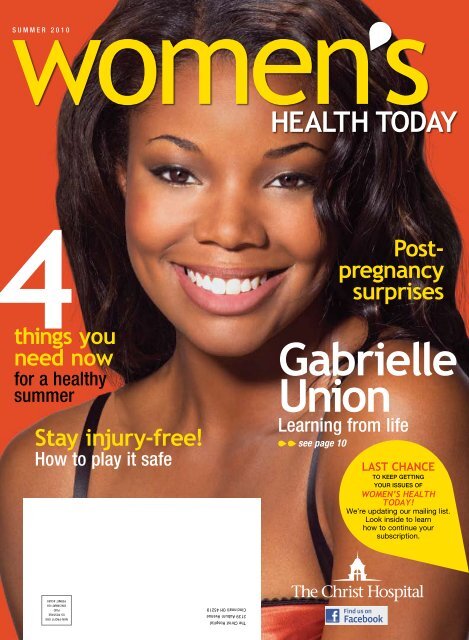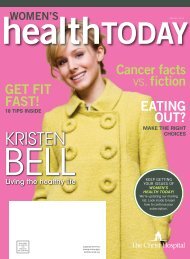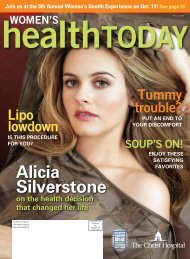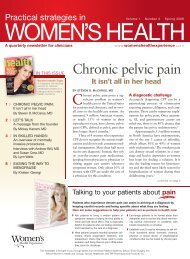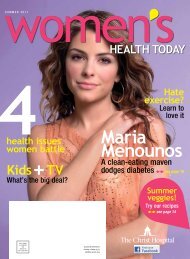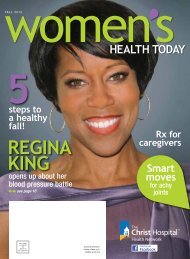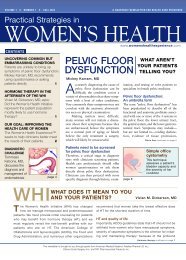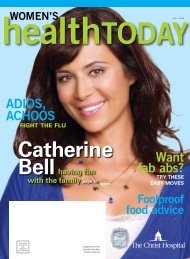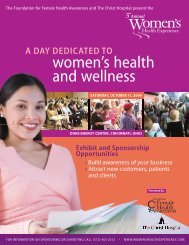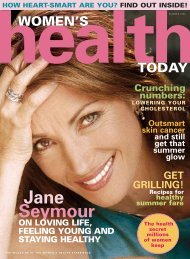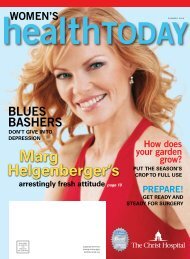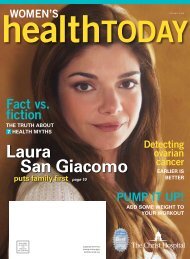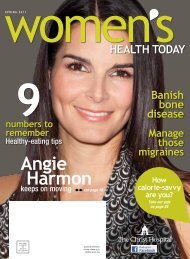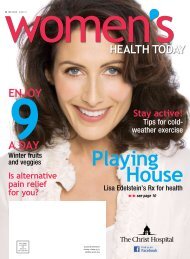Gabrielle Union - The Christ Hospital
Gabrielle Union - The Christ Hospital
Gabrielle Union - The Christ Hospital
Create successful ePaper yourself
Turn your PDF publications into a flip-book with our unique Google optimized e-Paper software.
women s<br />
S u m m e r 2 0 1 0<br />
health today<br />
Postpregnancy<br />
surprises<br />
things you<br />
need now<br />
for a healthy<br />
summer<br />
Stay injury-free!<br />
How to play it safe<br />
<strong>Gabrielle</strong><br />
<strong>Union</strong><br />
Learning from life<br />
see page 10<br />
LAST CHANCE<br />
to keep getting<br />
your issues of<br />
Women’s Health<br />
Today!<br />
We’re updating our mailing list.<br />
Look inside to learn<br />
how to continue your<br />
subscription.<br />
<strong>The</strong> <strong>Christ</strong> <strong>Hospital</strong><br />
2139 Auburn Avenue<br />
Cincinnati OH 45219<br />
non-profit org<br />
us postage<br />
Paid<br />
cincinnati oh<br />
Permit #5489
{And now I know heart attack signs for women are different.}<br />
Chest pain is one of the most common reasons for emergency<br />
Heart Attack Signs for Women<br />
Chest pain and discomfort<br />
Shortness of breath<br />
Nausea/vomiting<br />
Back or jaw pain<br />
Fatigue<br />
room visits. That’s why we’ve created the Chest Pain Center at<br />
<strong>The</strong> <strong>Christ</strong> <strong>Hospital</strong> Heart and Vascular Center — the first and only<br />
center in Cincinnati to receive full accreditation from the Society<br />
of Chest Pain Centers. A woman’s symptoms for a heart attack can<br />
present differently from a man’s. Here, our team is specially trained<br />
in evaluating women to quickly diagnose their source of pain and<br />
deliver the best course of care.<br />
To schedule a $99 Heart CT Scan to determine heart attack risk,<br />
call 513.585.2668.<br />
Caring Above All ṢM<br />
2139 Auburn Avenue | Cincinnati, OH 45219 | www.<strong>The</strong><strong>Christ</strong><strong>Hospital</strong>.com/heartandvascular
in this issue...<br />
s u m m e r 2 0 1 0<br />
>> Features<br />
4<br />
Women die<br />
of heart<br />
attacks, too<br />
3 What’s behind your<br />
pelvic pain?<br />
4 Women die of heart<br />
attacks, too<br />
How can you prevent one?<br />
5 Normal aging or<br />
something else?<br />
Keeping tabs on your<br />
parents’ health<br />
8 Tough talks<br />
How to tell your physician<br />
about embarrassing problems<br />
10 <strong>Gabrielle</strong>’s guidelines<br />
No-nonsense healthy living!<br />
16 Sweet talking<br />
Tips for battling<br />
bad breath<br />
17 Top joint injuries<br />
and how to avoid them<br />
20 Hormone help<br />
Balancing the scales<br />
21 Summer essentials<br />
4 warm-weather must-haves<br />
22 Postpartum problems?<br />
Join the club!<br />
>> Departments<br />
© istockphoto.com/John Krajewski/Javier Fontanella/Judy Picciotto<br />
2 LETTER FROM THE FOUNDER<br />
You’re never alone!<br />
6 HEALTH HEADLINES<br />
What’s making news<br />
in women’s health<br />
9 SEX & GENDER MATTERS<br />
Chickenpox isn’t just<br />
for kids<br />
Look out for shingles<br />
14 HEALTHY BITES<br />
Exotic harvest<br />
Take a vacation from the<br />
usual fruits and veggies<br />
18 HEALTHY MOVES<br />
In fitness and in health<br />
Double the pleasure and<br />
shape up together<br />
14<br />
Exotic<br />
harvest<br />
21<br />
Summer<br />
essentials<br />
18<br />
In fitness<br />
and in health<br />
24 HEALTH SMARTS<br />
Can you hear me now?<br />
www.womenshealthexperience.com
Printed With Soy Ink<br />
Please Recycle This Publication<br />
LETTER FROM THE FOUNDER<br />
women s<br />
health today<br />
Dr. Karram and his wife,<br />
Mona, are the founders of the<br />
Foundation for Female Health<br />
Awareness, a nonprofit<br />
organization dedicated to<br />
improving women’s health by<br />
supporting unbiased medical<br />
research and educating women<br />
about their health.<br />
Keep it<br />
coming!<br />
We’re updating our<br />
mailing list and want<br />
to ensure our loyal<br />
readers continue<br />
to receive Women’s<br />
Health Today.<br />
To continue your<br />
complimentary subscription,<br />
visit www.<br />
<strong>The</strong><strong>Christ</strong><strong>Hospital</strong>.<br />
com/women and<br />
complete the online<br />
form, or call us at<br />
513-585-1000. (If<br />
you’ve already called<br />
or subscribed online,<br />
there’s no need to<br />
do so again.) We<br />
look forward to<br />
providing you with<br />
important and timely<br />
health information!<br />
You’re never alone!<br />
>> If you’re a new mom and wonder why<br />
you’re not feeling as joyous as those<br />
women you see in magazines and on television,<br />
don’t fret. While more than 10 percent of<br />
women struggle with postpartum depression, many<br />
women also experience other somewhat troubling<br />
post-pregnancy health problems. A national expert<br />
offers his opinion on issues ranging from hair loss<br />
to wrist pain and more in “Postpartum problems?”<br />
(page 22) to help set your worries to rest.<br />
Enjoy the season!<br />
Now that summer is upon us, get out there<br />
and enjoy the great outdoors. But don’t forget to<br />
be safe! Before you pick up that tennis racket or<br />
golf club, read “Top joint injuries” on page 17 to<br />
learn how to prevent knee, ankle, shoulder and<br />
wrist injuries. <strong>The</strong>n, move on to page 18 for tips<br />
on how you and your significant other can get or<br />
stay fit together (“In fitness and in health”).<br />
As you prepare to enjoy the sun and fun, be<br />
sure you’ve stocked up on the medicine-cabinet<br />
must-haves in “Summer essentials” on page 21.<br />
And, after you’ve worked up an appetite from<br />
all your healthy activity, consult page 14’s “Exotic<br />
harvest” for some ideas on new fruits and<br />
vegetables to try.<br />
In just those few pages, Women’s Health<br />
Today can help you plan your safe summer day!<br />
You’ll find more interesting and important health<br />
topics throughout this issue. If there’s a topic<br />
you’d like to read about that we haven’t covered<br />
yet, let me know. I’d love to hear from you!<br />
Sincerely,<br />
Mickey M. Karram, MD<br />
PRESIDENT AND Co-Founder<br />
Foundation for Female Health Awareness<br />
the magazine of<br />
the foundation for female health awareness<br />
Founders<br />
Mickey M. Karram, MD / Mona Karram<br />
National Advisory Board<br />
Linda Brubaker, MD, Professor of Obstetrics and Gynecology,<br />
Urogynecology Urology, Loyola University Chicago Stritch School<br />
of Medicine; Co-Director, Women’s Pelvic Medicine Center,<br />
Loyola University Medical Center<br />
Vivien K. Burt, MD, PhD, Associate Professor of<br />
Clinical Psychiatry, <strong>The</strong> David Geffen School of Medicine at UCLA;<br />
Founder and Director, Women’s Life Center,<br />
UCLA Neuropsychiatric Institute and <strong>Hospital</strong><br />
Vivian M. Dickerson, MD, Associate Clinical Professor of<br />
Obstetrics and Gynecology, University of California Irvine;<br />
Director, Division of General Obstetrics and Gynecology, UCI<br />
Medical Center; Director of UCI’s Post Reproductive Women’s<br />
Integrative Health Center<br />
Tommaso Falcone, MD, Professor and Chairman, Department<br />
of Gynecology and Obstetrics, <strong>The</strong> Cleveland Clinic Foundation;<br />
Co-Director, Center for Advanced Research in Human<br />
Reproduction and Infertility<br />
Sebastian Faro, MD, PhD, Clinical Professor of Obstetrics and<br />
Gynecology, Women’s <strong>Hospital</strong> of Texas<br />
Nieca Goldberg, MD, Assistant Professor of Medicine,<br />
SUNY Health Science Center, Brooklyn, New York;<br />
Clinical Assistant Professor of Medicine, New York University<br />
Thomas Herzog, MD, Professor of Clinical Obstetrics and<br />
Gynecology, Columbia University College of Physicians and<br />
Surgeons; Director, Division of Gynecologic Oncology, Columbia<br />
University Medical Center, New York<br />
Barbara Levy, MD, Medical Director, Women’s Health & Breast<br />
Center, St. Francis <strong>Hospital</strong>, Federal Way, Washington; Assistant<br />
Clinical Professor of Obstetrics & Gynecology, Yale University<br />
School of Medicine; Assistant Clinical Professor of Obstetrics and<br />
Gynecology, University of Washington School of Medicine<br />
Wendy l. wright, ARNP, FAANP, Adult/Family Nurse<br />
Practitioner; Adjunct Faculty, Fay W. Whitney School of Nursing,<br />
University of Wyoming<br />
<strong>The</strong> <strong>Christ</strong> <strong>Hospital</strong> STAFF<br />
President and CEO Susan Croushore<br />
Chief Business Development Officer Victor DiPilla<br />
Chief <strong>Hospital</strong> Officer Deborah Hayes<br />
Chief Strategy and Mission Officer Heather Adkins<br />
Chief Medical Officer Berc Gawne, MD<br />
Editor Arin Kraemer<br />
customer service<br />
For more information about services at<br />
<strong>The</strong> <strong>Christ</strong> <strong>Hospital</strong>, please contact Arin Kraemer at<br />
arin.kraemer@thechristhospital.com or 513-585-3945.<br />
Women’s Health Today is published four times a year by<br />
<strong>The</strong> <strong>Christ</strong> <strong>Hospital</strong>, 2139 Auburn Avenue, Cincinnati, OH 45219,<br />
in conjunction with the Foundation for Female Health Awareness,<br />
PO Box 43028, Cincinnati, OH 45243. This is Volume 6, Issue 3.<br />
© 2010 by <strong>The</strong> <strong>Christ</strong> <strong>Hospital</strong> and the Foundation for<br />
Female Health Awareness. All rights reserved.<br />
<strong>The</strong> information contained herein is not a<br />
substitute for professional medical care<br />
or advice. If you have medical concerns, seek the<br />
guidance of a healthcare professional.<br />
recycle-logo_2options_v2.ai<br />
Women’s Health Today magazine is part of<br />
Women’s Health Experience, the flagship program of the<br />
Foundation for Female Health Awareness. Women’s Health<br />
Experience is a unique initiative aimed at connecting women<br />
with healthcare experts, as well as their local hospitals, to learn<br />
about important issues that may affect their health. Through<br />
Women’s Health Experience, Women’s Health Today magazine<br />
and www.womenshealthexperience.com, you’ll get objective,<br />
timely information. You can also sign up for free e-newsletters<br />
Printed With Soy Ink<br />
Printed With Soy Ink<br />
containing health news and results of medical studies.<br />
Sign up now at www.womenshealthexperience.com.<br />
Please Recycle This Publication<br />
Cover: <strong>Gabrielle</strong> <strong>Union</strong><br />
© 2010 Jack Chuck/CORBIS OUTLINE<br />
Please Recycle This Publication<br />
<br />
women’s health today<br />
Printed With Soy Ink<br />
Please Recycle This Publication
Fibroids<br />
What’s<br />
behind your<br />
pelvic pain?<br />
Endometriosis<br />
Pelvic inflammatory disease<br />
By Kevin Fitzgerald, MD<br />
>> Pain is your body’s way of saying something<br />
isn’t quite right. But when it comes to pelvic pain,<br />
it can be hard to pin down exactly what’s wrong. And<br />
because you may be accustomed to some monthly pelvic<br />
discomfort, you may not realize that your symptoms<br />
aren’t what they used to be. When your pain changes,<br />
worsens, affects your daily life or seems to come with new<br />
symptoms, make an appointment with your physician.<br />
Some common causes of pelvic pain include:<br />
Endometriosis. When endometrial tissue grows<br />
outside the uterus on your ovaries, fallopian tubes or<br />
other pelvic structures, it may cause pain and cramping<br />
and painful periods with heavy bleeding. You may also<br />
have back or abdominal pain; pain with bowel movements<br />
or urination; or sharp, deep pelvic pain during<br />
intercourse.<br />
Ovarian cysts<br />
Caring Above All for women!<br />
<strong>The</strong> experts at <strong>The</strong> <strong>Christ</strong> <strong>Hospital</strong> Women’s Surgery Center<br />
perform more minimally invasive gynecologic surgeries than<br />
any other hospital in the region, including laparoscopic<br />
surgery, minimally invasive and single-incision hysterectomy<br />
and robotic-assisted surgery. We strive to always offer<br />
women more—through our commitment to the newest<br />
procedures, the latest technology and to Caring Above All. SM<br />
To learn more about minimally invasive surgery and to<br />
discuss your options with a physician, call 513-585-1000.<br />
© istockphoto.com/nasenmann<br />
Fibroids. One in four women with these benign<br />
uterine tumors experiences symptoms that may include<br />
pelvic pressure or pain, heavy or prolonged periods,<br />
spotting, frequent urination, constipation and back or<br />
leg pain.<br />
Ovarian cysts. You may feel a dull ache in your<br />
lower back and thighs, heaviness in your abdomen<br />
or pressure on your rectum or bladder. Most cysts<br />
disappear within a few menstrual cycles. Sometimes,<br />
though, one will continue to grow and may rupture or<br />
twist—causing sudden, sharp or worsening pelvic or<br />
abdominal pain.<br />
Pelvic inflammatory disease. With this bacterial<br />
infection, you may feel pain in your lower belly and<br />
pain during a pelvic exam or intercourse. You may also<br />
have a fever, irregular bleeding and unusual discharge.<br />
See your physician for a thorough exam during<br />
which he or she may also check for bladder or other<br />
infections, pregnancy, irritable bowel syndrome or<br />
nerve disorders. <strong>The</strong> sooner you seek treatment, the<br />
sooner you’ll enjoy relief. WHT<br />
>> Kevin Fitzgerald, MD, is a board-certified obstetrician/gynecologist with <strong>The</strong> <strong>Christ</strong> <strong>Hospital</strong>.<br />
www.womenshealthexperience.com
Women die of<br />
heart attacks, too<br />
How can you prevent one?<br />
>> While women are typically<br />
the nurturers in the family,<br />
many forget to take care of<br />
themselves. That’s why for some<br />
women, the first symptom of heart<br />
disease is a heart attack.<br />
Many women simply don’t<br />
connect their risk factors and their<br />
own chance of developing heart<br />
disease. In addition, heart disease<br />
looks and acts differently in women<br />
than it does in men. Typical symptoms<br />
tend to be more vague and<br />
may include:<br />
• chest discomfort, pressure or<br />
achiness instead of crushing chest<br />
pain<br />
We treat your heart here<br />
• a burning sensation in the chest<br />
or upper abdomen<br />
• shortness of breath, irregular<br />
heartbeat, nausea, jaw pain,<br />
dizziness, sweating or fatigue<br />
If you experience these<br />
symptoms, it’s important to<br />
call 911 immediately and be<br />
sure to tell the paramedics<br />
to take you to a “heart<br />
hospital” or a hospital that<br />
has experience in treating<br />
heart attacks. <strong>The</strong> American<br />
College of Cardiology and<br />
American Heart Association<br />
(ACC/AHA) guidelines recommend<br />
treatment within<br />
<strong>The</strong> <strong>Christ</strong> <strong>Hospital</strong> has the only accredited Chest Pain Center in<br />
Greater Cincinnati that specializes in chest pain and heart attack<br />
treatment. We consistently treat heart attack patients at or below the<br />
90-minute ACC/AHA guideline. To learn more and receive “A Woman’s<br />
Signs of Heart Attack” magnet, call 513-585-1000.<br />
90 minutes in order to alleviate<br />
major heart muscle damage. That<br />
means 90 minutes from the time<br />
you get to the hospital to the time<br />
the physician is able to open your<br />
blocked artery in the cardiac<br />
catheterization lab.<br />
Be on guard<br />
Don’t let a heart attack sneak<br />
up on you. Take control of your<br />
health:<br />
Are you<br />
at risk?<br />
Find out your risk for heart<br />
disease today. Visit www.<br />
<strong>The</strong><strong>Christ</strong><strong>Hospital</strong>.com/<br />
heartaware for a free risk<br />
assessment and more.<br />
• Make an appointment with your<br />
healthcare provider to discuss<br />
your personal risk factors such<br />
as your family heart history, age,<br />
smoking status, exercise habits,<br />
weight, waist size, blood pressure,<br />
cholesterol and blood sugar.<br />
• Get screened. <strong>The</strong> <strong>Christ</strong> <strong>Hospital</strong><br />
also offers a $99 heart computed<br />
tomography (CT) scan. Using a<br />
low dose of radiation with a 64-<br />
slice CT scanner, this quick, painless<br />
test can detect cholesterol<br />
buildup in the arteries. <strong>The</strong>se<br />
tests are performed at <strong>The</strong> <strong>Christ</strong><br />
<strong>Hospital</strong> and <strong>The</strong> <strong>Christ</strong> <strong>Hospital</strong><br />
Imaging Center on Redbank Road.<br />
Heart CT scans can be scheduled<br />
by calling 513-585-2668. WHT<br />
© istockphoto.com/John Krajewski<br />
<br />
women’s health today
Normal aging<br />
or something<br />
else?<br />
Keeping tabs on your<br />
parents’ health<br />
By Jason Graff, MD, and Robert Keyes, MD<br />
>> Perhaps you’ve noticed your mom has lost<br />
weight, seems weaker and is a bit confused lately.<br />
Although it could be part of normal aging, these symptoms<br />
can also be attributed to other medical causes. For<br />
example, she may be suffering from depression. Perhaps<br />
a medication side effect is causing her sudden confusion.<br />
Memory issues<br />
Some minor memory changes that don’t impair daily<br />
activities or quality of life—such as taking longer to<br />
recall a person’s name or finding the right word—can<br />
be normal with age. But not remembering the right<br />
road to take to the grocery store or not being aware<br />
of a memory lapse can be a sign of another problem.<br />
While getting older is inevitable, many changes and<br />
declines we associate with aging may be the result of<br />
treatable conditions.<br />
What to discuss<br />
When symptoms occur, begin discussing your<br />
concerns with your parent and encourage him or her<br />
to visit a primary care physician. Even insomnia and<br />
frequent urination warrant a trip to the physician<br />
because these problems are often not age-related. Your<br />
mom may insist she’s fine, but consider otherwise if<br />
you spot any of these warning signs:<br />
• physical unsteadiness, shuffling steps, dizziness<br />
• muscle weakness<br />
• weight loss or gain<br />
• bruising<br />
• confusion<br />
• increased memory problems<br />
• social withdrawal<br />
• insomnia<br />
• incontinence<br />
• increased urination or other urinary problems<br />
• a struggle to perform tasks like taking medication,<br />
paying bills or following a recipe<br />
• poor judgment<br />
• uncharacteristic behavior such as irritability, worry,<br />
anger, agitation or suspicion<br />
By taking action now, you can help your parent take<br />
steps to prevent further disability and learn to recognize<br />
when he or she may benefit from a geriatrician,<br />
a physician who specializes in caring for aging adults.<br />
You, along with your parent’s geriatrician and care<br />
team, can help your parent improve his or her function<br />
and enjoy life. WHT<br />
We can help you help them!<br />
<strong>The</strong> new Center for Health and Aging at <strong>The</strong> <strong>Christ</strong> <strong>Hospital</strong><br />
can help by serving as a consultant or your parents’ sole<br />
primary care provider. To learn more or to schedule an<br />
appointment, call 513-272-8444.<br />
>> Jason Graff, MD (left), and Robert Keyes, MD, are board-certified internists<br />
and geriatricians with <strong>The</strong> <strong>Christ</strong> <strong>Hospital</strong> Center for Health and Aging.<br />
www.womenshealthexperience.com
Health Headlines<br />
>> what’s making news in women’s health<br />
Aspirin benefits<br />
breast cancer patients<br />
Besides being used as a<br />
painkiller, aspirin is popular for<br />
its cardiovascular benefits, helping<br />
to prevent heart attacks and<br />
strokes in men and women.<br />
Now aspirin may have another<br />
use: reducing the risk of death<br />
after breast cancer. Harvard<br />
researchers found that of more<br />
than 4,000 women diagnosed<br />
with breast cancer from 1976<br />
to 2002, those who took aspirin<br />
regularly—mostly to prevent<br />
heart attacks and stroke—had<br />
a 50 percent lower risk of dying<br />
from breast cancer or having<br />
the cancer spread than women<br />
who weren’t taking aspirin. <strong>The</strong><br />
results suggest that nonsteroidal<br />
anti-inflammatory drugs like<br />
ibuprofen might have a similar<br />
benefit. Researchers think it may<br />
be due to the drugs’ ability to<br />
reduce inflammation (chronic<br />
inflammation can promote cancer<br />
growth). However, they note<br />
that because of the side-effect<br />
risks, aspirin shouldn’t be taken<br />
without a doctor’s supervision<br />
and it should be avoided if<br />
you’re undergoing chemotherapy<br />
or radiation. <strong>The</strong> research was<br />
part of the Nurses’ Health<br />
Study, an ongoing investigation<br />
into many health conditions.<br />
Women aren’t<br />
taking this<br />
message to heart<br />
<strong>The</strong> message seems to be<br />
everywhere: Heart disease is<br />
the No. 1 killer of women. <strong>The</strong><br />
American Heart Association’s<br />
(AHA’s) Go Red For Women<br />
campaign focuses on educating<br />
women and reducing heart disease<br />
and stroke. Despite these<br />
and other efforts, almost 50 percent<br />
of all American women still<br />
aren’t aware that heart disease is<br />
their top cause of<br />
death, reports<br />
an AHA survey.<br />
<strong>The</strong> survey<br />
also found<br />
that only half<br />
of women could<br />
identify heart<br />
attack symptoms, and<br />
slightly more than half would call<br />
911 if they were experiencing<br />
warning signs (nausea; jaw pain;<br />
or pain, tightness or squeezing in<br />
the chest). Researchers say heart<br />
experts need to come up with<br />
different ways to communicate<br />
prevention messages—perhaps<br />
through community programs<br />
or social networking sites like<br />
Facebook and Twitter. Women<br />
also need to be proactive about<br />
their heart health, making sure to<br />
eat healthfully and exercise. And<br />
if you think you may be having<br />
a heart attack, don’t hesitate in<br />
calling 911.<br />
Images on pages 6 and 7 © istockphoto.com/Medobear/Kutay Tanir/Carrie Wendel/Rich Legg/VisualField<br />
<br />
women’s health today
Can running be<br />
in your blood?<br />
Have you always found it easy to run that 5K? <strong>The</strong>re could be<br />
a genetic reason for your talent. A small study of track-and-field<br />
athletes found that those who did well in marathons and similar<br />
activities had a variation in the NRF2 gene, which has been<br />
shown to boost energy and lessen the effects of inflammation.<br />
Researchers looked at 155 athletes and discovered that among<br />
Olympic-level athletes, 80 percent of those who did well in<br />
endurance sports had the variation, compared to 46 percent<br />
of sprinters. More research is needed to determine specifically<br />
what role the gene plays in your athletic performance.<br />
Young women: Don’t<br />
drink and drive!<br />
While most drunk drivers<br />
are men, women who have had<br />
a few too many are still getting<br />
behind the wheel. Researchers<br />
at Yale University and other<br />
institutions, using United States<br />
National Highway Traffic Safety<br />
Administration data, found that the<br />
number of female drivers involved<br />
in fatal crashes increased between<br />
1995 and 2007 for 19- to 20-<br />
year-olds and 21- to 24-year-olds,<br />
while men either experienced no<br />
change or saw rates decrease.<br />
Experts blame social pressures for<br />
the increase, as women turn<br />
to drugs and alcohol to<br />
lose inhibitions and<br />
feel like they’re<br />
part of the crowd.<br />
<strong>The</strong>y recommend<br />
drunk-driving<br />
messages be<br />
geared toward young<br />
women—for example,<br />
stressing that<br />
driving drunk puts<br />
others in danger<br />
and can lead to<br />
prison time or result<br />
in disfigurement or<br />
other disabling injuries.<br />
<strong>The</strong> number of female drivers involved<br />
in fatal crashes increased between<br />
1995 and 2007 for 19- to 20-year-olds<br />
and 21- to 24-year-olds.<br />
www.womenshealthexperience.com
Tough talks<br />
How to tell your physician about embarrassing problems<br />
>> Talking with your healthcare<br />
provider about your sex<br />
life, unusual bowel movements<br />
or feelings of depression is<br />
never easy. Revealing that you’re<br />
the victim of domestic violence or<br />
that you have a drinking problem<br />
can be even tougher. Yet all relate<br />
to your health and warrant medical<br />
attention. Getting the proper treatment<br />
begins with an honest dialogue.<br />
<strong>The</strong> next time you have an<br />
embarrassing question or problem,<br />
remember these tips:<br />
• Find an understanding healthcare<br />
provider. Some women<br />
prefer talking to other<br />
women; others just want<br />
a compassionate listener.<br />
Remember, the physician<br />
should be there to<br />
help you, not to judge or<br />
preach.<br />
• Keep in mind that your physician<br />
has heard it before. No matter<br />
how upsetting a problem might<br />
seem, your physician has most<br />
likely dealt with it several times<br />
before—especially if he or she has<br />
been in practice for a while.<br />
• Bring visual aids. If you’re having<br />
trouble launching the conversation,<br />
consider showing him or her an<br />
article about your problem.<br />
• Write down details and questions.<br />
Whether it’s changes in bowel<br />
movements, depression or sexual<br />
dysfunction, describe what you’re<br />
experiencing and when it started,<br />
so you have a clear picture of<br />
what’s going on and can answer<br />
your physician’s questions. Listing<br />
your own questions will help you<br />
get the answers you’re seeking.<br />
Describe<br />
what you’re<br />
experiencing<br />
and when it<br />
started.<br />
• Use the right words. While you<br />
don’t need to get too technical,<br />
it can help if you describe your<br />
problem with the right anatomical<br />
terms and a good description of<br />
your symptoms.<br />
• Talk about the effects on your life.<br />
How have changes in your bowel<br />
patterns affected your life or the<br />
lack of desire impacted your relationship?<br />
<strong>The</strong> answers will help<br />
your physician assess the seriousness<br />
of your problem, which will<br />
help determine treatment. WHT<br />
Time to take action!<br />
Now that you’re armed with these tough-talk tips,<br />
it’s time to schedule your appointment. To find<br />
the right primary care physician or specialist for<br />
you, call <strong>The</strong> <strong>Christ</strong> <strong>Hospital</strong> physician referral line<br />
at 513-585-1000.<br />
<br />
women’s health today
Sex & Gender Matters<br />
>> By Jennifer Wider, MD<br />
<strong>The</strong> latest findings on women-specific health<br />
from the Society for Women’s Health Research<br />
Chickenpox<br />
isn’t just<br />
for kids<br />
Look out for shingles<br />
>> Thought you were done with chickenpox as<br />
a kid? Think again. Shingles, a disease caused by the<br />
same virus as chickenpox, affects roughly 1 million<br />
Americans each year. As people age, their risk of getting<br />
shingles increases, yet many people are completely<br />
unaware of the disease.<br />
After a person gets the chickenpox (most often<br />
during childhood) the inactivated virus can live on<br />
in certain nerve cells in the body. In healthy people,<br />
the body’s immune system usually keeps the virus at<br />
bay. As people age or their immune system becomes<br />
compromised, the virus can reactivate and result in<br />
shingles. Although seniors are at higher risk, shingles<br />
can affect people of all ages.<br />
What to look for<br />
<strong>The</strong> first signs of shingles may not be visually<br />
noticeable. People often experience tingling, burning,<br />
itching or pain and will break out in a rash. Some people<br />
experience post-herpetic neuralgia, long-term nerve<br />
pain that can persist for months or even years after the<br />
initial rash. <strong>The</strong> older a person gets, the more he or<br />
she is at risk for post-herpetic neuralgia.<br />
Shingles patients are often given analgesics along<br />
with antiviral medications for treatment. Antiviral medicines<br />
for shingles may help speed up healing and reduce<br />
pain in some patients. Treatment should begin within<br />
72 hours of the onset of symptoms if possible. WHT<br />
Caution for older women<br />
While the disease affects the sexes equally, its greater<br />
impact on older adults should capture the attention of<br />
women. “Women make up almost 70 percent of the<br />
population 85 years and older, so any condition that<br />
is prone to strike older people is of special concern to<br />
women,” says Phyllis Greenberger, MSW, president<br />
and chief executive officer of the Society for Women’s<br />
Health Research. “Older Americans should talk to their<br />
healthcare providers about their risk for shingles.”<br />
Learn more!<br />
<strong>The</strong> Society for Women’s Health Research<br />
(SWHR), a national nonprofit organization based<br />
in Washington, D.C., is widely recognized as the<br />
thought leader in research on sex differences and<br />
is dedicated to improving women’s health through<br />
advocacy, education and research. To find this<br />
article and more, visit www.swhr.org.<br />
>> Jennifer Wider, MD, is a medical advisor for the Society for Women’s Health Research in Washington, D.C.<br />
www.womenshealthexperience.com
I like to look like<br />
a woman and not<br />
be reed thin. I like<br />
to look like I have<br />
a butt and hips.<br />
10 women’s health today
N o - n o n s e n s e h e a l t h y l i v i n g !<br />
B y B o n n i e S i e g l e r<br />
© Roberto D’Este/Corbis Outline<br />
>> At age 37, actress <strong>Gabrielle</strong> <strong>Union</strong> has<br />
learned from her past experiences—some<br />
good, some bad—and she’s always come<br />
out a winner. Case in point: She turned a<br />
violent episode at age 19 into an opportunity<br />
to use her celebrity as an advocate for rape<br />
crisis centers throughout America.<br />
And her family history of diabetes has<br />
put <strong>Union</strong> on the fast track to healthy<br />
eating. “A lot of my family illnesses stem<br />
from obesity, and diabetes is rampant in my<br />
family,” says the Neutrogena spokesperson<br />
and co-star of ABC’s now-defunct sci-fi series<br />
“FlashForward.” “That’s why I’m diligent<br />
about working out and eating right. I’m aware<br />
of my genetics. And nobody knows your body<br />
better than you do, so if you know you have a<br />
history of breast cancer [my aunt had stage 2],<br />
diabetes, heart disease or whatever, you should<br />
definitely take a proactive approach. I get<br />
regular mammograms and I get my blood<br />
checked for diabetes. You have to be your<br />
own guideline.”<br />
continued on page 12 >><br />
www.womenshealthexperience.com<br />
11
continued from page 11<br />
Does that mean she’s given up on sugar? “Absolutely<br />
not! But I don’t have a lot of sugars in what I’m eating.<br />
I don’t go overboard. I also don’t eat a lot of processed<br />
foods, which have high sugar and sodium counts.”<br />
What a real woman eats<br />
At 5 feet 8 inches, <strong>Union</strong>’s nutritional staples<br />
include leafy greens, peanut butter, morning protein<br />
shakes topped with flaxseed and an occasional calcium<br />
supplement. “Always rice drink,”<br />
she says with her gleaming dimpled<br />
smile. “I’ll have my granola<br />
with that in the morning. No<br />
coffee because I don’t do caffeine.<br />
I always have organic fruits and<br />
veggies around, but I have to<br />
be honest …” she trails off and<br />
then exclaims, “I refuse to give<br />
up real butter or ground beef. So<br />
there you have it! If you want to<br />
switch to turkey, go ahead, but<br />
I can’t do it. If I want tacos or a<br />
burger, I need ground beef.”<br />
About 10 years ago, <strong>Union</strong><br />
says, her body stopped being<br />
able to efficiently process dairy,<br />
so she’s done away with whole<br />
milk. “I still have butter and<br />
cheese but just deal with the side<br />
effects later on. And instead of<br />
eating the whole tube of cookie<br />
dough, I might have a spoonful.<br />
I’m not completely denying<br />
myself. That’s not the way to<br />
live. I like to look like a woman<br />
and not be reed thin. I like to<br />
look like I have a butt and hips and if that size 2 dress<br />
doesn’t fit because I’m a real adult woman in a size 6,<br />
that’s okay with me.”<br />
Obsessing over weight just isn’t <strong>Union</strong>’s make-up.<br />
Her numbers on the scale go up and down. “It depends<br />
upon my level of fitness at the time. I do like to be a<br />
size 28 jean but there are times I’m a 30 and there are<br />
times I’m a 27. I try not to obsess over it. Being honest<br />
about my size means I’m enjoying life. Sometimes that<br />
involves a nice bottle of wine with some cheese and<br />
good conversation with friends.”<br />
I love my smile.<br />
After ... getting the<br />
braces off when I<br />
was 14, I’ve been<br />
smiling ever since.<br />
A reason to smile<br />
Friends play an integral part in <strong>Union</strong>’s life. <strong>The</strong>y<br />
keep her grounded and “real” and give meaning to what<br />
matters. “I’ve always had a large group of girlfriends,”<br />
says the actress. “I never knew how lucky I was until I<br />
started acting on location without easy access to friends.<br />
I never felt lonelier. My friends are my lifeline; they’re<br />
the oil and the gas that make me go and move forward.”<br />
And she does—with her trademark smile, which came<br />
after years of corrective braces.<br />
“I love my smile,” <strong>Union</strong> says.<br />
“After being tormented about my<br />
buckteeth for years and getting the<br />
braces off when I was 14, I’ve been<br />
smiling ever since.” On the flip<br />
side, <strong>Union</strong> says her biggest flaw<br />
is that of so many other women.<br />
“We stare in the mirror and look<br />
at cellulite,” she laughs.<br />
Exercising her options<br />
A former high school athlete<br />
who played soccer, track, bas-<br />
ketball and other sports, <strong>Union</strong>’s<br />
love of fitness and competitive<br />
skills were sharpened at an early<br />
age. “I love to work out,” she<br />
admits. “I do cardio on the<br />
elliptical about five days a week,<br />
but my routine varies day to day.<br />
If I’m on my own, it’s usually 45<br />
minutes of cardio, alternating<br />
between arm and leg exercises<br />
and at least 15 minutes of<br />
stretching at the end. If I’m<br />
working out with my trainer, it’s<br />
cardio intensive. Sometimes it’s kickboxing, sometimes<br />
a track workout.”<br />
While her sports-playing days are behind her,<br />
<strong>Union</strong> credits their influence in giving her an edge<br />
in both her life and career. “Sports bring together all<br />
different kinds of people from different backgrounds.<br />
You need to find out how to work together for a<br />
common goal, and that skill set is always with you,”<br />
she says. “I’ve learned how to deal with my competitive<br />
nature in a positive way. It prepared me to deal with<br />
rejection with class and dignity.<br />
WHT<br />
© Jack Chuck/Corbis Outline<br />
12 women’s health today
PRESENTED BY<br />
TM<br />
Y W<br />
our Update in<br />
omen’s Health<br />
A biweekly radio program<br />
Alternate Sundays, 8:30–9 a.m. on 101.9 FM<br />
Hosted by Mickey Karram, MD<br />
President and Co-Founder, Foundation for Female Health Awareness<br />
Director of Urogynecology, <strong>The</strong> <strong>Christ</strong> <strong>Hospital</strong>, Cincinnati<br />
Join Dr. Karram and his guests from <strong>The</strong> <strong>Christ</strong> <strong>Hospital</strong><br />
as they explore a variety of topics essential to your health.<br />
Check out new audio from recent programs—available<br />
now at www.WomensHealthExperience.com.<br />
healthy hearing<br />
Guest: Lisa D. Cahill, Phd, CCC-a,<br />
Audiologist, <strong>The</strong> <strong>Christ</strong> <strong>Hospital</strong><br />
healthy vision<br />
Guest: michael e. daun, md,<br />
Ophthalmologist, <strong>The</strong> <strong>Christ</strong> <strong>Hospital</strong><br />
building strong bones<br />
and osteoporosis prevention<br />
Guest: thomas j. redington, md,<br />
Internal Medicine Specialist,<br />
<strong>The</strong> <strong>Christ</strong> <strong>Hospital</strong><br />
female sexual dysfunction<br />
Guest: ronald hirth, MD, Obstetrician/<br />
Gynecologist, <strong>The</strong> <strong>Christ</strong> <strong>Hospital</strong><br />
pelvic floor/core rehabilitation<br />
Guests: kathleen novicki, Physical<br />
<strong>The</strong>rapist, Administrator, Center for Pelvic<br />
Floor and Core Rehabilitation Services<br />
lisa johnstone, Physical <strong>The</strong>rapist,<br />
Center for Pelvic Floor and Core Rehabilitation<br />
Services<br />
organ donation<br />
Guest: michael a. cardi, md, Medical<br />
Director of Transplantation, <strong>The</strong> <strong>Christ</strong> <strong>Hospital</strong><br />
disorders of the digestive<br />
system<br />
Guests: martha ferguson, md,<br />
Colorectal Surgeon, <strong>The</strong> <strong>Christ</strong> <strong>Hospital</strong><br />
karen haberthier, MD, Gastroenterologist,<br />
<strong>The</strong> <strong>Christ</strong> <strong>Hospital</strong><br />
managing menopause<br />
Guests: kenneth e. palmer, MD,<br />
Obstetrician/Gynecologist,<br />
<strong>The</strong> <strong>Christ</strong> <strong>Hospital</strong><br />
donna m. cirasole, md, Obstetrician/<br />
Gynecologist, <strong>The</strong> <strong>Christ</strong> <strong>Hospital</strong><br />
heart and circulatory system<br />
disorders<br />
Guests: peter engel, MD, Medical Director<br />
of Pulmonary Hypertension, <strong>The</strong> <strong>Christ</strong> <strong>Hospital</strong><br />
eugene chung, md, Medical Director of<br />
Outcomes, <strong>The</strong> <strong>Christ</strong> <strong>Hospital</strong> Heart and<br />
Vascular Center<br />
SPONSORED BY<br />
www.womenshealthexperience.com<br />
IN CONJUNCTION WITH<br />
13
HEALTHY BITES<br />
Exotic harvest<br />
Take a vacation from the usual fruits and veggies<br />
>> Apples, oranges, tomatoes and broccoli certainly offer plenty of vitamins,<br />
minerals and fiber, but eating them all the time can get boring. So why not explore<br />
some more exotic offerings? Make these simple substitutions the next time you’re food<br />
shopping. If you can’t find them in your market, ask the produce manager to help you or<br />
check a local ethnic market.<br />
> If you like<br />
apples<br />
> If you like<br />
pomegranates<br />
> Try<br />
Asian pears<br />
> How they taste<br />
crisp, juicy, slightly<br />
sweet and tart<br />
> What to look for<br />
<strong>The</strong> most popular variety,<br />
the Japanese pear,<br />
is round with smooth,<br />
yellow skin. Pick the<br />
most fragrant fruit that<br />
feels firm, with few or no<br />
brown spots.<br />
> If you likE<br />
cantaloupe<br />
> Try<br />
star fruit<br />
> How they taste<br />
like a mix of plums,<br />
pineapples and lemons<br />
> What to look for<br />
Choose firm, evencolored<br />
fruit with shiny<br />
skin and light brown rib<br />
edges.<br />
> Try<br />
passion fruits<br />
> How they taste<br />
tangy, similar to guava,<br />
with a strong aroma<br />
> What to look for<br />
Passion fruits are<br />
egg-shaped, with<br />
wrinkled purple-brown<br />
skin and seeds and<br />
orange pulp. Pick large,<br />
heavy, firm fruit.<br />
> If you likE<br />
peaches<br />
> Try<br />
mangoes<br />
> How they taste<br />
like a mix of peach and<br />
pineapple<br />
> What to look for<br />
Select firm, plump fruits<br />
that give slightly to pressure.<br />
Ripe mangoes<br />
have a fruity aroma at<br />
the stem end; those with<br />
a yellow tinge have the<br />
best flavor.<br />
Images aon pages 14 and 15 © istockphoto.com/Kelly Kline/RedHelga/<br />
Javier Fontanella/Joan Kimball/Scott Harms/Jill Chen/Kae Horng Mau<br />
14 women’s health today
Bored with apples,<br />
oranges and<br />
tomatoes? Explore<br />
some more exotic<br />
fruit and vegetable<br />
options instead.<br />
> If you like<br />
green peppers<br />
> If you like<br />
summer squash<br />
> Try<br />
edible cactus<br />
> How they taste<br />
similar to a green<br />
pepper<br />
> What to look for<br />
Purchase small, firm,<br />
pale-green cacti with<br />
fleshy, oval leaves and<br />
no wrinkling. Skip limp<br />
or dry ones.<br />
> If you like<br />
tomatoes<br />
> Try<br />
tomatillos<br />
> How they taste<br />
slightly acidic, with a<br />
hint of lemon<br />
> What to look for<br />
Tomatillos resemble<br />
small, unripe green<br />
tomatoes. Pick one with<br />
an intact, tight-fitting<br />
light brown husk.<br />
> Try<br />
chayote squash<br />
> How they taste<br />
Chayote squash doesn’t<br />
have much taste, which<br />
makes it perfect to mix<br />
into most dishes.<br />
> What to look for<br />
This pale green vegetable<br />
is about the size<br />
and shape of a large<br />
pear with slight ridges<br />
running lengthwise.<br />
Select small, firm, heavy,<br />
unblemished squash.<br />
> If you like<br />
carrots<br />
> Try<br />
jicama<br />
> How they taste<br />
similar to a pear; when<br />
cooked, jicama takes<br />
on the flavor of other<br />
ingredients<br />
> What to look for<br />
Look for a firm tuber that<br />
looks like a turnip or<br />
radish with dry roots and<br />
unblemished skin.<br />
www.womenshealthexperience.com<br />
15
Sweet talking >> Tips for battling bad breath<br />
>> Help yourself to garlic chicken at dinner, and<br />
you won’t wonder why your breath is less than,<br />
well, fresh. And, of course, it’s nothing that a little<br />
time and a good toothbrushing won’t remedy. But<br />
chronic halitosis is another story.<br />
Bad breath can be caused by anything from gum disease<br />
to postnasal drip to a rigorous exercise session to<br />
diabetes. Another common trigger is dieting (in particular<br />
a high-protein, low-carbohydrate diet), which causes<br />
the body to burn fat and produce by-products that cause<br />
bad breath. Eating less also reduces saliva production;<br />
this, in turn, contributes to halitosis because saliva is<br />
necessary to flush bacteria from the mouth. (Ironically,<br />
mouthwashes with a high alcohol content actually can<br />
cause halitosis by drying the mouth.) Stress can bring<br />
on foul breath by causing changes in body chemistry.<br />
And some medications can be culprits.<br />
What can you do to avoid this embarrassing problem?<br />
Besides avoiding spicy foods, garlic, onions and<br />
alcohol, these strategies can help:<br />
Brush up … and down.<br />
Carry a toothbrush and<br />
a small tube of toothpaste<br />
with you and brush after<br />
every meal. Don’t forget to<br />
brush the roof of your mouth<br />
as well as your tongue.<br />
Quit smoking.<br />
Stopping will bring<br />
instant breathfreshening<br />
results.<br />
Floss.<br />
Flossing removes<br />
particles between<br />
teeth that otherwise<br />
decay and contribute<br />
to halitosis.<br />
See your dentist<br />
regularly.<br />
In addition to professional<br />
cleanings, regular exams by<br />
your dentist will ensure that<br />
any tooth or gum problems<br />
are detected and treated<br />
promptly.<br />
Drink up.<br />
Water works magic on the<br />
body—and your breath.<br />
Drinking at least eight<br />
glasses a day can keep<br />
your mouth moist and help<br />
rid it of bacteria.<br />
What next?<br />
Bad breath that won’t go away<br />
despite the steps described here<br />
should be checked out by your<br />
dentist or healthcare provider to<br />
rule out any underlying causes.<br />
© istockphoto.com/Jacob Wackerhausen<br />
16 women’s health today
Top joint<br />
injuries<br />
and how to avoid them<br />
>> Athletes aren’t the only people at risk for torn ligaments and<br />
twisted ankles. Everyday activities such as gardening and housecleaning<br />
can cause strains, sprains and other injuries. Beware of these common<br />
injuries and take steps to prevent them:<br />
>> Knee injuries: To avoid ligament<br />
and tendon injuries, meniscus tears,<br />
bursitis and patellar injuries, choose<br />
shoes that fit and are appropriate<br />
for your activity. Use protective<br />
gear such as cushions for gardening<br />
or knee braces for hiking.<br />
>> Twisted ankles: Approximately<br />
25,000 people suffer a sprained<br />
ankle every day, whether due to<br />
stepping on an uneven surface or<br />
playing sports. To protect your<br />
ankles, warm up before activities,<br />
pay attention to where you’re walking<br />
and be extra careful when you<br />
walk in heels.<br />
>> Shoulder injuries: Any activity<br />
that involves repetitive, overhead<br />
motions, such as washing windows,<br />
can cause a shoulder injury. Sports<br />
like swimming can also leave you<br />
with problems such as shoulder<br />
instability or dislocation or a<br />
rotator cuff injury. To fend off<br />
problems, try these exercises:<br />
• Wall push-ups—Stand facing a<br />
wall with your hands on it, feet<br />
shoulder-width apart. Do a slow<br />
push-up. Hold for a count of five.<br />
Repeat five times.<br />
• Shoulder press-ups—Sit in a chair<br />
with armrests, feet on the floor.<br />
Use your arms to slowly rise up<br />
and off the chair. Hold for a count<br />
of five. Repeat five times.<br />
>> Wrist injuries: Two common<br />
problems: sprains (often the<br />
result of a fall) and carpal tunnel<br />
syndrome, a repetitive motion<br />
disorder. Sprains occur when the<br />
ligaments connecting bones are<br />
stretched. Carpal tunnel syndrome<br />
occurs when tendons in the carpal<br />
tunnel, a narrow channel that runs<br />
through the wrist, swell and press<br />
on the nerves. It’s often caused by<br />
repetitive motions such as knitting,<br />
golfing or typing.<br />
To protect your wrists, be extra<br />
careful when walking on slippery<br />
or uneven surfaces. Limit the time<br />
you spend on activities involving<br />
the wrist or take frequent breaks.<br />
>> Tennis elbow: Most people who<br />
get tennis elbow—inflammation<br />
of the tendons surrounding the<br />
elbow—don’t even play tennis. You<br />
can get it after doing repetitive<br />
motions like raking or painting.<br />
Guard against tennis elbow<br />
with exercises that strengthen<br />
the forearm and wrist. Warm up<br />
before activity and take regular<br />
breaks from your computer, sewing<br />
machine or garden. WHT<br />
Don’t let joint pain get you down!<br />
If joint pain is impacting your quality of life, it may be time for you to<br />
see a specialist. Orthopedists are physicians who specialize in surgical<br />
and nonsurgical treatment of joint injuries. To find a <strong>Christ</strong> <strong>Hospital</strong><br />
orthopedist near you, call our physician referral line at 513-585-1000.<br />
www.womenshealthexperience.com<br />
17
HEALTHY MOVES<br />
In fitness<br />
and in health<br />
Double the pleasure and shape up together<br />
>> Exercise is like a magic cure-all. It can help<br />
you maintain a healthy weight; sleep better; improve<br />
your strength, energy and endurance; relieve stress and<br />
anxiety; and reduce your risk for heart disease, cancer<br />
and osteoporosis. So, if exercise can do all that, why is<br />
it that two out of three of us don’t get nearly enough<br />
or any at all?<br />
Lack of time, motivation and enjoyment are among<br />
the top reasons people don’t exercise. One way to get<br />
around those barriers is to recruit someone to work<br />
out with you—someone to motivate you to make time<br />
Got kids?<br />
You can either book a regular sitter for your<br />
exercise time or make working out a family affair by<br />
using some of these ideas. Better yet, do both.<br />
• Join a gym that offers childcare, classes or<br />
playtime for children.<br />
• If your kids play organized sports, leave your lawn<br />
chairs in the car and walk laps around<br />
the soccer field during practices or<br />
games.<br />
• Bring little ones along for the ride.<br />
Use a backpack carrier, a jogging<br />
stroller or a child seat or<br />
trailer for your bike.<br />
• Take family outings that keep<br />
you moving, such as bike<br />
rides, hikes or paddling<br />
adventures.<br />
in your schedule, cheer you through periods of<br />
waning energy, challenge you to improve and, simply<br />
put, make it fun! Studies show that people who have<br />
the support of a fitness partner exercise more. You’d<br />
think twice about skipping your early morning jog if<br />
you knew someone was waiting for you at the park.<br />
Socializing makes any activity more enjoyable, and a<br />
buddy can make trying new things like joining a gym or<br />
taking that kickboxing class less intimidating.<br />
<strong>The</strong> couple that exercises together …<br />
For many women, a natural choice is their spouse<br />
or partner. Getting fit and healthy with your loved<br />
one means you can spend more quality time together,<br />
deepen your relationship and intimacy and help ensure<br />
you really will grow old together.<br />
Your first step is to sit down with your calendars<br />
and determine when you can get together. It may not<br />
be realistic to meet up for every workout, but schedule<br />
a shared workout at least once or twice a week, even if<br />
it’s just for a walk around the neighborhood. Next,<br />
decide what you’re going to do. Joining a gym<br />
or taking classes together is a great way to<br />
get into the fitness habit. In your quest<br />
to find activities you both like, keep an<br />
open mind and explore each other’s<br />
interests. Has your guy been trying to<br />
get you to take up golf? Eager for him<br />
to chill and try yoga? Encourage each<br />
other and work as a team. Don’t push<br />
18 women’s health today
When you’re both<br />
beginners, it<br />
eliminates the tension<br />
that can arise<br />
when one person<br />
is the expert.<br />
your other half beyond his capabilities<br />
or allow competitiveness to cause<br />
a rift in your relationship.<br />
Have fun!<br />
Try some of these ideas to keep<br />
you and your partner in shape:<br />
• Plan an immediate reward. If you<br />
can’t get your mate to start moving,<br />
find local events to attend together<br />
that make a perfect excuse to get out<br />
for a walk, such as a music festival in<br />
the park or a church carnival.<br />
• Forgo passive Friday night dates. Instead of dinner<br />
and a movie, head to the roller rink or dance hall and<br />
boogie the night away.<br />
• Team up. Many communities have adult coed recreation<br />
teams, such as volleyball, softball, bowling or<br />
soccer. Find one you can both enjoy.<br />
• Tap into your competitive edge. Enter competitions<br />
together, such as road races and tennis, bowling or<br />
golf tournaments. Many competitions have a couples<br />
category.<br />
• Book an adventurous vacation. Consider an invigorating<br />
getaway, such as skiing in the Rockies, sea<br />
kayaking in Hawaii or trekking through the European<br />
countryside.<br />
• Double date. Find another couple to join you for a<br />
weekly game of tennis or golf.<br />
• Learn a new sport or activity together. When you’re<br />
both beginners, it eliminates the tension that can arise<br />
when one person is the expert and the other is the<br />
novice who’s doing it wrong. Consider trying tae kwon<br />
do, in-line skating or dancing.<br />
• Dive into the water world. When you think of heading<br />
to the beach, do you envision lying listless on the sand<br />
for hours? Water sports can be quite vigorous and tons<br />
more fun. Get off your towels and try surfing, snorkeling,<br />
windsurfing or sailing.<br />
• Give the gift of fitness. Are you always at a loss for<br />
what to give your man for holiday and birthday presents?<br />
Think of all the sports gear you could give like<br />
hiking boots, in-line skates, a mountain bike, workout<br />
wear and more.<br />
• Set ultimate goals. Completing a marathon or<br />
reaching the peak of a mountain might have seemed<br />
far-fetched at one time, but when you’re both working<br />
toward a common goal, anything is possible.<br />
• Be charitable. Take part in fitness events for worthy<br />
causes important to both of you, such as the March<br />
of Dimes’ March for Babies or Relay For Life for the<br />
American Cancer Society. WHT<br />
www.womenshealthexperience.com<br />
19
Hormone help >> Balancing the scales<br />
>> Could menopausal hormone therapy (HT) be right for you? Ease menopausal symptoms, prevent heart<br />
disease, look younger, boost sex drive—what wasn’t to like? But ever since a large-scale federal study threw cold<br />
water on some of these claims and linked HT to a range of health risks, making the right decision has been a<br />
balancing act. Here’s what you need to know if you plan on discussing HT with your healthcare provider:<br />
<strong>The</strong> good<br />
When it comes to treating<br />
the main symptoms of<br />
menopause—hot flashes,<br />
night sweats, vaginal<br />
dryness—HT is the gold<br />
standard. It also wards off<br />
osteoporosis, improves<br />
cholesterol and cuts<br />
colon cancer risk.<br />
<strong>The</strong> bad<br />
Some HT (estrogen plus progestin)<br />
actually raises the risk of heart<br />
attack, blood clots and stroke. It also<br />
increases your chances of developing<br />
breast cancer and, if you’re 65 or<br />
older, dementia. No evidence proves<br />
that it reduces wrinkles or improves<br />
sex drive. And, the evidence is still<br />
out on estrogen alone.<br />
<strong>The</strong> murky<br />
In the federal study, for every<br />
10,000 women, HT (estrogen<br />
plus progestin) led to seven<br />
additional cases of heart disease,<br />
eight cases of breast cancer and<br />
stroke and 18 cases of blood<br />
clots each year. That means that<br />
while the risks are real, they’re<br />
relatively low for any individual<br />
woman. Another tough call: For<br />
some women, improvement in<br />
menopausal symptoms may be<br />
offset by side effects like bloating,<br />
bleeding or breast tenderness.<br />
Age also matters: Heart risks<br />
appear greater for women older<br />
than age 60.<br />
Need help weighing the options?<br />
Call <strong>The</strong> <strong>Christ</strong> <strong>Hospital</strong> physician referral line at 513-585-1000 to<br />
find a gynecologist near you.<br />
<strong>The</strong> upshot<br />
<strong>The</strong>re are no easy answers, and<br />
what’s right for other women<br />
may be wrong for you. Your<br />
provider will help you weigh the<br />
risks and benefits. If you have<br />
heart disease, breast cancer<br />
or a history of blood clots, you<br />
should avoid HT, and if you have<br />
a family history of these diseases,<br />
the risks of HT might outweigh<br />
the benefits. But if you’re at low<br />
heart disease or cancer risk and<br />
your menopause symptoms<br />
are getting the better of you,<br />
HT may be the way to go. If<br />
you choose HT, work with your<br />
healthcare provider to determine<br />
the lowest possible dose to<br />
relieve symptoms, and take it for<br />
the shortest time necessary.<br />
20 women’s health today
Summer<br />
essentials<br />
4<br />
warm-weather must-haves<br />
>> It’s summertime and the living is easy—until<br />
you end up with sunburn, bug bites, rashes or<br />
cuts. <strong>The</strong> best way to counter them? Be prepared.<br />
Stock up on these medicine-cabinet essentials:<br />
MUST-HAVE WHAT TO LOOK FOR APPLY IT<br />
1<br />
Sunscreen<br />
Choose sunscreen that’s water resistant,<br />
has an SPF of at least 30 and is broad<br />
spectrum. And don’t forget lip balm with<br />
an SPF of 30 or higher.<br />
Slather an ounce (about a shot-glass full) on sunexposed<br />
areas of the body 15 to 30 minutes before<br />
heading out. Reapply every two hours or as soon as you<br />
towel off from a swim or after heavy sweating.<br />
2<br />
Bug<br />
repellent<br />
If you’re spending more than three to<br />
four hours outside or you’ll be in a spot<br />
with plenty of insects, try a product with<br />
20 percent to 50 percent of the chemical<br />
DEET. If you plan to spend less time<br />
outdoors, look for repellents with less<br />
than 20 percent DEET, lemon eucalyptus<br />
oil or 7 percent picaridin.<br />
Spray just enough to cover exposed skin and clothing.<br />
Don’t wear it under your clothes and don’t spray it on<br />
your face. <strong>The</strong> Environmental Protection Agency has<br />
deemed it safe for human use—just apply the product<br />
exactly as directed. <strong>The</strong> American Academy of Pediatrics<br />
says don’t use anything higher than a 30 percent concentration<br />
of DEET on children, and don’t use DEET on<br />
kids under age 2 months or lemon eucalyptus oil on<br />
those under age 3.<br />
© istockphoto.com/Judy Picciotto/<strong>Christ</strong>ine Glade<br />
3<br />
4<br />
Poison ivy<br />
prevention<br />
Antibiotic<br />
cream<br />
Over-the-counter bentoquatam<br />
lotion (Ivy Block ® )<br />
forms a coating on the<br />
skin to help block poison<br />
oak, poison ivy and poison<br />
sumac oils from triggering<br />
rashes.<br />
Antibiotic creams such as bacitracin,<br />
Neosporin and Polysporin keep a<br />
wound’s surface moist and help keep<br />
infection-causing bacteria from getting<br />
in. Minor cuts and scrapes will heal fine<br />
without creams, but these products may<br />
help speed healing and reduce scarring.<br />
Put it on 15 minutes before you head out and reapply<br />
at least once every four hours for as long as you may<br />
be exposed to the plants. Bentoquatam is flammable, so<br />
stay away from fires and open flames when applying or<br />
wearing it and ask a healthcare provider before using it<br />
on children younger than age 6. If you do come in contact<br />
with poisonous plants, wash your skin in cool water<br />
as soon as possible.<br />
Put a thin layer on the wound<br />
after cleaning it. If you want,<br />
cover it with a bandage. Long<br />
or deep cuts and those that<br />
won’t stop bleeding should be<br />
checked out in the emergency<br />
room.<br />
www.womenshealthexperience.com<br />
21
Postpartum problems?<br />
Join the club!<br />
>> You’re no longer constantly getting up at night to go to the bathroom, your<br />
heartburn is gone and you can finally see your toes. But has anyone ever told you<br />
that with the end of pregnancy comes a whole range of other problems? Learn more here:<br />
Sweating<br />
Sweating is your body’s<br />
way of getting rid of<br />
excess fluid that accumulated in<br />
your body during pregnancy,<br />
although hormones also play a part<br />
in your ability to soak the sheets.<br />
“What happens right after delivery<br />
is a mirror image of what happens<br />
in menopause, but the process is<br />
sped up,” says Paul Gluck, MD, a<br />
board-certified obstetrician/<br />
gynecologist and associate clinical<br />
professor at the University of Miami<br />
School of Medicine. “At delivery,<br />
the high estrogen levels of pregnancy<br />
drop dramatically, causing<br />
the sweats.” <strong>The</strong> problem may<br />
persist for just a few weeks or for<br />
as long as you breastfeed.<br />
>> What you can do: Drink lots of<br />
water to keep from getting dehydrated.<br />
Wear light cotton clothing<br />
to bed and crank up the fan.<br />
Women:<br />
Learn more!<br />
Find more pregnancy and<br />
general women’s health<br />
information at www.<strong>The</strong><strong>Christ</strong><br />
<strong>Hospital</strong>.com/women.<br />
Image on page 23 © istockphoto.com/Marc Brown/bubaone/Nicole K. Cioe<br />
22 women’s health today
Hair loss<br />
When you were<br />
pregnant, your locks<br />
were more lustrous thanks to<br />
hormones that kept your hair from<br />
shedding as it normally would.<br />
Now that you’ve had your baby,<br />
you may find all that extra hair<br />
falling out as your hormones<br />
change yet again.<br />
>> What you can do: Let nature<br />
take its course. Most women’s<br />
manes are back to normal within<br />
three to six months. In the meantime,<br />
experiment with different<br />
hairstyles to cover any thinned<br />
spots and avoid curling irons, hair<br />
dryers and other tools that can<br />
cause damage.<br />
de Quervain’s<br />
tenosynovitis<br />
Blame the unnatural<br />
hand and wrist positions you use to<br />
hold your child for that wrist pain.<br />
Such awkward motions can cause<br />
the tendons in the thumb side of<br />
your wrist to become inflamed and<br />
swollen, resulting in pain when you<br />
turn your wrist, grasp an object<br />
or make a fist. Carpal tunnel<br />
syndrome, which affects the inside<br />
of the wrist, isn’t the same as<br />
de Quervain’s (also known as<br />
“mother’s thumb”), which involves<br />
only the thumb tendon.<br />
>> What you can do: Keep your<br />
thumb and wrist straight with a<br />
splint or brace. Apply heat or ice<br />
to the affected area. Nonsteroidal<br />
anti-inflammatory medications,<br />
such as ibuprofen and naproxen,<br />
and corticosteroid medications can<br />
also help. In more serious cases,<br />
physical therapy or surgery may be<br />
needed.<br />
Incontinence<br />
Between pregnancy<br />
and birth, your bladder<br />
muscles and supporting tissues<br />
are subjected to a fair amount of<br />
stretching, so a tinkle when you<br />
laugh or cough isn’t uncommon.<br />
“Most women who experience<br />
some incontinence will find their<br />
symptoms resolve within just a few<br />
months,” says Dr. Gluck. “While<br />
a lengthy labor may have some<br />
impact, a woman’s anatomy and the<br />
size of the baby have more impact<br />
on whether the new mom will have<br />
urinary or fecal incontinence.”<br />
>> What you can do: Urinary<br />
incontinence usually improves<br />
within three months. Ask your<br />
healthcare provider how to do Kegel<br />
exercises, which help strengthen<br />
your pelvic floor muscles. If fecal<br />
or urinary incontinence continues<br />
beyond a few months, visit your<br />
physician to discuss options for<br />
resolving the problem. WHT<br />
Ask the Expert >> Featuring Paul Gluck, MD<br />
Both my sister and<br />
mother experienced<br />
severe postpartum<br />
depression. Now<br />
that I’m pregnant,<br />
I’m terrified of<br />
going through that<br />
myself. Is postpartum<br />
depression<br />
hereditary?<br />
A: No, postpartum depression (PPD) is not hereditary—<br />
but that doesn’t mean your family isn’t a factor in PPD.<br />
What’s important is whether you have a supportive family<br />
environment or an unhealthy one. Besides your family<br />
situation, hormonal changes in your brain chemicals also<br />
impact whether you go through PPD.<br />
One of the key differences between the baby<br />
blues and this type of depression is the timing of the<br />
start of symptoms. About 80 percent or more of new<br />
moms experience some sort of sadness post-delivery,<br />
but it occurs within days after the baby is born. With<br />
PPD, symptoms generally begin about two to four<br />
weeks after birth. In addition, women with the blues<br />
are still able to function well, taking care of the baby,<br />
the house and other children. Women with PPD become<br />
nonfunctional, not wanting to get out of bed or take care<br />
of their infant. Symptoms include a loss of interest in<br />
activities, fatigue, sleeping too little or too much, appetite<br />
changes and thoughts of suicide or death.<br />
It’s important to remember that PPD is a real<br />
physical problem based on a chemical imbalance in<br />
the brain, and you should feel no shame or fear in<br />
asking your physician for help. And nearly all the<br />
medications used to treat PPD can be taken while<br />
you’re breastfeeding, so there will be no harm to your<br />
baby. If, several weeks after your baby is born, you<br />
feel like you’re suffering from PPD, don’t delay in<br />
getting help—both for your sake and your baby’s.<br />
www.womenshealthexperience.com<br />
23
HEALTH SMARTS<br />
Can you hear<br />
me now?<br />
>> Many people don’t want to admit they have trouble<br />
hearing. But the fact is, roughly one-third of Americans ages<br />
65 to 74 have hearing loss. Though aging is a primary risk<br />
factor, many adults start to lose some hearing in their 30s<br />
and 40s. Test your knowledge of hearing loss by answering<br />
true or false to these statements and checking your answers.<br />
TRUE or False?<br />
1 <br />
Most hearing loss is genetic, and there’s<br />
nothing you can do about it.<br />
2 <br />
You could have a hearing problem and<br />
not realize it.<br />
3 <br />
<strong>The</strong>re are many ways to treat hearing loss.<br />
4<br />
<br />
Hearing loss can lead to other health problems.<br />
5 <br />
Hearing aids don’t work very well.<br />
Answers<br />
1 False. Hearing loss can be<br />
caused by many things, including<br />
infections, some medications and<br />
especially exposure to loud noise.<br />
Noise-induced hearing loss is<br />
100 percent preventable. Protect<br />
your hearing by avoiding noises at or<br />
above 85 decibels, which includes<br />
gas lawnmowers, snowblowers,<br />
motorcycles, firecrackers and<br />
loud music.<br />
Test your health<br />
knowledge online<br />
Take more health quizzes and assessments online<br />
at www.womenshealthexperience.com.<br />
Plus, find out what other women are saying by<br />
participating in our online polls!<br />
2 True. <strong>The</strong> following questions<br />
can help you identity a problem:<br />
• Do you have difficulty hearing on<br />
the telephone?<br />
• Do you have trouble hearing with<br />
noise in the background?<br />
• Do you have a hard time following<br />
a conversation when two or more<br />
people talk at once?<br />
• Do people complain that you turn<br />
the TV volume up too high?<br />
• Do you hear ringing,<br />
roaring or hissing<br />
sounds frequently?<br />
• Do some sounds seem<br />
too loud?<br />
3 True. Early detection<br />
can help your physician<br />
prescribe treatments that<br />
can slow or reverse hearing<br />
loss. Unfortunately,<br />
only 29 percent of adults ages 20<br />
to 69 have had their hearing tested<br />
within the last five years. If you think<br />
that you have a hearing problem,<br />
schedule an appointment with your<br />
healthcare provider.<br />
4 True. People with hearing loss<br />
often become depressed. Hearing loss<br />
can also put you at danger if you can’t<br />
hear warning sounds. Beyond health<br />
issues, hearing loss prevents people<br />
from fully participating in everyday life.<br />
5 False. Newer, digital models,<br />
though expensive, use a computer<br />
chip to process sounds and are very<br />
good at adjusting to different environments.<br />
And there are other devices<br />
that can be plugged directly into TVs,<br />
stereos and personal sound systems<br />
to help you hear better. WHT<br />
© istockphoto.com/Jill Chen<br />
24 women’s health today
Stay informed<br />
Stay connected<br />
Stay healthy<br />
Presented by the<br />
with www.womenshealthexperience.com<br />
Women’s Health Experience offers you health<br />
news and information just for women!<br />
Sign up for a free monthly e-newsletter that delivers the<br />
latest health news, trends and tips to your inbox.<br />
Test your health smarts on fitness, nutrition, disease<br />
prevention and more with online quizzes.<br />
Take our online health assessments to learn your<br />
risk for common diseases and conditions.<br />
Learn what other women are thinking by<br />
participating in our online health polls.<br />
Find out what the Women’s Health Experience<br />
can do for you!<br />
It’s all here—and it’s all for you at<br />
www.womenshealthexperience.com<br />
TM
{It’s been much more fun living without it.}<br />
Don’t let neck pain keep you from enjoying life. <strong>The</strong> experts at<br />
<strong>The</strong> <strong>Christ</strong> <strong>Hospital</strong> Spine Institute use a multi-disciplinary<br />
approach to diagnose and treat people who suffer from chronic<br />
neck pain. Our team of physicians, radiologists, surgeons and<br />
physical therapists work together to pinpoint the most effective<br />
treatment for each patient. Whether that involves surgery,<br />
non-surgical options, physical therapy or rehabilitation, we<br />
serve every patient with a commitment to Caring Above All ṢM<br />
Call to schedule an appointment.<br />
513.585.BACK<br />
Caring Above All ṢM<br />
2139 Auburn Avenue | Cincinnati, OH 45219 | www.<strong>Christ</strong>SpineInstitute.com


